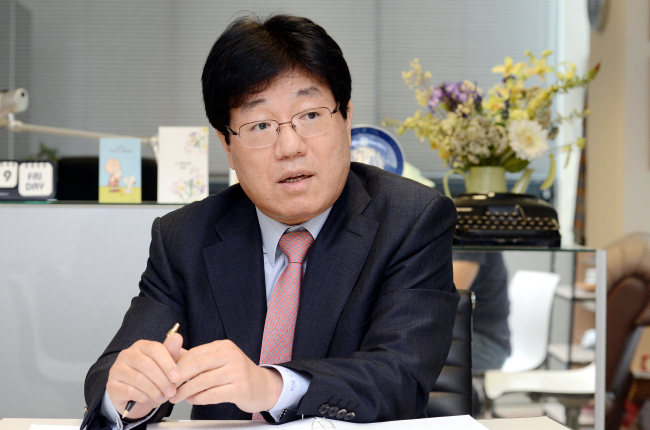English newspapers crucial to language learning: professor
By Korea HeraldPublished : Aug. 13, 2013 - 20:24
The 16-year-old middle-school student flipped through the English dictionary, slowly pushing aside the wrinkled sheets of paper. He squinted his eyes as he stared intensely at the book, while ignoring his mother’s calls to come and eat dinner.
“Mr. Kim Hong-yup, I will not repeat myself. Get over here and eat your dinner,” snapped his mother from the kitchen.
Hong-yup barely mumbled a reply. “I’m busy, mom.”
The freckled teenager was a bookworm, but he was taking on a new challenge in the realm of texts, one that the ace student was determined not to fail in.
Entering his freshman year of high school, Hong-yup had decided to challenge himself in “free discussion” sessions with an English native speaker from the U.S. by attending a local hagwon in the winter of 1970. To prepare himself, Hong-yup decided to subscribe to The Korea Herald. He was reading through that morning’s edition to memorize a column discussing the Vietnam War.
Forty-three years later, Kim, a professor specializing in civil law and litigation at Sungkyunkwan University Law School in Seoul, continues to read the newspaper. Kim has outgrown the free discussion sessions since 1970, but he has become rather fond of the English articles
“Mr. Kim Hong-yup, I will not repeat myself. Get over here and eat your dinner,” snapped his mother from the kitchen.
Hong-yup barely mumbled a reply. “I’m busy, mom.”
The freckled teenager was a bookworm, but he was taking on a new challenge in the realm of texts, one that the ace student was determined not to fail in.
Entering his freshman year of high school, Hong-yup had decided to challenge himself in “free discussion” sessions with an English native speaker from the U.S. by attending a local hagwon in the winter of 1970. To prepare himself, Hong-yup decided to subscribe to The Korea Herald. He was reading through that morning’s edition to memorize a column discussing the Vietnam War.
Forty-three years later, Kim, a professor specializing in civil law and litigation at Sungkyunkwan University Law School in Seoul, continues to read the newspaper. Kim has outgrown the free discussion sessions since 1970, but he has become rather fond of the English articles

“I wake up at 5:30 a.m. to read The Korea Herald and watch English television news on CNN or the BBC. I don’t know if I should call this a habit or an addiction,” he says, chuckling.
Kim enjoys the sports section but focuses on the top stories in national politics and business to find content that he can use in his classes. The columns are equally essential for such a purpose.
“I understand that the columns are subjective opinions, but I also think listening to other thoughts and words helps me become at least a little bit more impartial,” he said, adding that impartiality was a trait which a law practitioner must pursue with diligence.
“Studying a foreign language also forces you to become very analytical. That is something which I am thankful to The Korea Herald for, because you must be very analytical to be good at law.”
Kim’s devotion to The Korea Herald, however, is not an unconditional love. He asks the paper to increase its expressive capabilities, to narrate more articulately and to tell more illustrative stories. “Everybody loves a great picture. Everybody loves a great story as well. And when readers see that in text, they are absorbed into the articles. I trust that The Korea Herald has writers who can enhance the paper’s abilities to do those kinds of things.”
He asks for The Korea Herald to be true to its roles as a watchdog and diplomat. “We need more newspapers and media to watch politics and be real observers so that our political culture can really grow. Our political culture must become more refined than it is today.”
By Jeong Hunny (hj257@heraldcorp.com)
-
Articles by Korea Herald










![[KH Explains] Naver’s Line dilemma: Lose global footing for cash?](http://res.heraldm.com/phpwas/restmb_idxmake.php?idx=644&simg=/content/image/2024/05/14/20240514050624_0.jpg&u=)
![[Herald Interview] Carbon breakthrough in Korea: Making diamonds at atmospheric pressure](http://res.heraldm.com/phpwas/restmb_idxmake.php?idx=644&simg=/content/image/2024/05/14/20240514050559_0.jpg&u=20240514184059)







